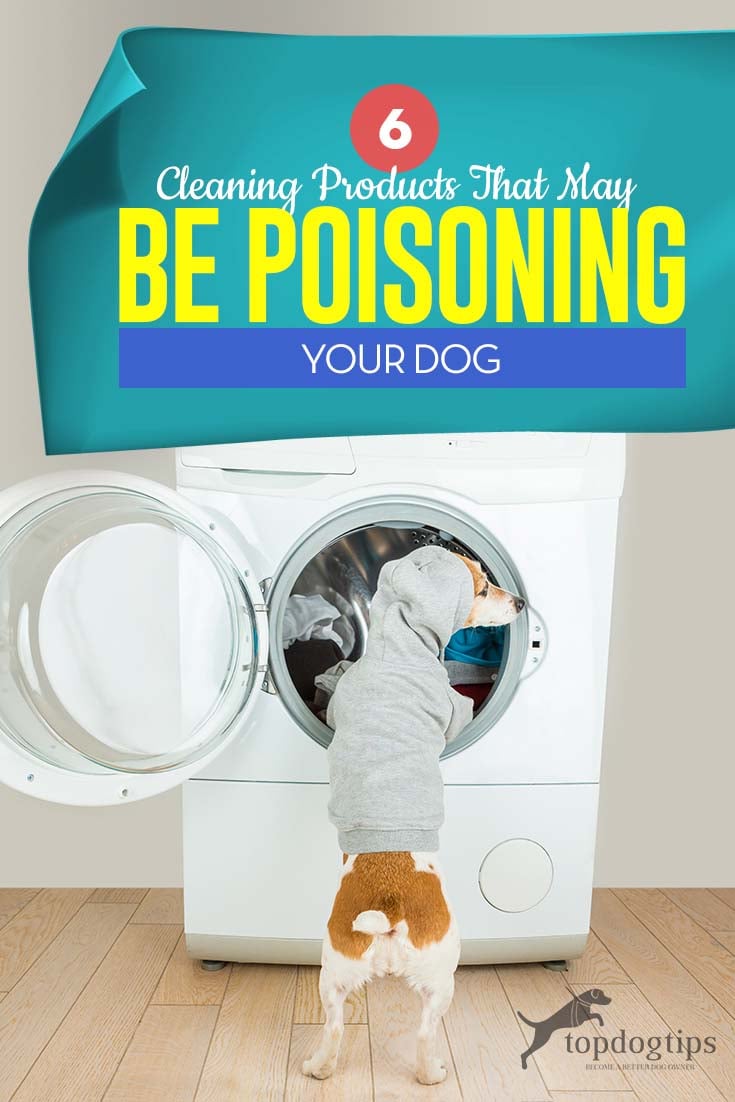A lot of familiar and commonly used household items and particularly cleaning products contain ingredients that can harm your dog. The chemicals in these products, which are strongly formulated to effectively removing bacteria, dirt, and grime, are too strong for pets when smelled or ingested.
It is not always easy to tell if the cleaning product has harmed your dog since the reaction may vary depending on how the poison was contracted. Some of the signs of cleaning product poisoning in dogs include rashes on the skin, eye irritation, breathing problems, diarrhea, vomiting, lethargy, seizures, and even coma and death.
ALSO READ: How to Make a Dog Throw Up (Due to Poisoning)
Here are six most common and very dangerous cleaning supplies that may harm your dog:
1. Bleach or Chlorine
This is a very strong disinfectant that is harmful even to humans. Bleach, which contains chlorine, is found in basic laundry and dishwashing detergents, toilet bowl cleaners, and all-purpose cleaners.
According to Dr. Lynn Hovda, bleach has been the cause of a handful of pet emergencies every year. It can damage the dog's esophagus and stomach in more serious cases and the dog won't recover from this for weeks.
Bleach that's non-chlorine, also known as color-safe bleach, has hydrogen peroxide. This may cause tissue irritation in dogs if ingested. Unfortunately, some dogs won't turn away bleach and even finish drinking it from the bucket. Other dogs will instantly turn their nose up and stay away from the chemical.
If your dog has come in contact with bleach or chlorine, you should:
- Give the dog a bath with plenty of water
- Use a mild dishwashing soap to wash off the chemical
- Give water and encourage the dog to drink to dilute the bleach inside his stomach
- Give your pet milk to neutralize the bleach
- Bring the dog the vet if your pet is still not doing well after an hour.
2. Ammonia
Ammonia is present in cleaning solutions for the oven, windows, stainless steel, and floor wax. This chemical has high volatile organic compound content that can trigger asthma and burn the mucous membranes in the lungs among humans, and its effects on dogs may be even worse. When mixed with bleach, ammonia can be a deadly poisonous gas for dogs.
If absorbed in extreme amounts, ammonia can lead hepatic encephalopathy or a type of liver dysfunction in pets. Symptoms of its effects include loss of appetite, irritability, confusion, disorientation, lethargy, changes in personality, aggression, seizure, and coma.
If your dog has ingested or swallowed ammonia, go to the vet immediately for testing and care. The animal might need intravenous fluids for rehydration and the vet may give medications that will coat the dog's intestines and prevent a seizure.
3. Phthalates
This chemical makes cleaning products more fragrant. Phthalates have been proven to be carcinogenic in humans. Phthalates may also cause damage and cancer to the liver, pancreas, and testicles of dogs, according to the National Health Institute (NIH).
Surprisingly, you can find phthalates not just in deodorizers or air freshers but also in some dog beds, toys, mats and training devices, as per a study in Chemosphere. Always check the product's label when you're buying stuff for your pets to see if these have chemicals that may harm them.
Experts advise not to buy toys that have a strong scent. Also, avoid buying anything that has been labeled as fire-retardant. If you're purchasing online, do a diligent research of the company or manufacturer first and if possible email them to ask about the safety of their products. They will respond with the information you need when they have nothing to hide.
4. Formaldehyde
Formaldehyde is often associated with funeral homes since it's the main ingredient for embalming bodies. This chemical has a nauseatingly strong smell but it's actually found in many cleaning products, paper towels, hand soaps, and even some dog shampoos. This gets absorbed in the dog's skin or inhaled in his lungs.
Unfortunately, this chemical is carcinogenic and may cause eye and skin irritation, according to this study. It can also impact an animal's metabolism and rate of mortality. As with phthalates content, check if the cleaning products or pet products you're buying for your dog do not have this ingredient.
5. Glycol Ethers
Glycol Ethers are found in liquid soap, spot removers, carpet cleaners, and glass cleaners. Some “natural” home cleaning solutions also have this ingredient but unfortunately, the Environmental Protection Agency (EPA) noted in its toxicological report that glycol ethers may lead to damages in the liver, kidney, nerves and the digestive system in both humans and animals.
This chemical is sweet-tasting so it's so easy for dogs to take a liking to it because of its flavor. According to the Veterinary Centers of America (VCA), there's a small window of safety if your dog licks even just a tiny amount so it's critical that you bring the dog to the vet immediately. The antidote for this poison is effective following eight to 12 hours of ingestion only. After that, the dog might not survive.
6. 1,4-Dioxane
This chemical is also known as ether and it is used in dryer sheets, paint or varnish, many pesticides, and cosmetic products, including some dog shampoos as a preservative. You won't see this listed in the labels of cleaning products although and there have not been any long-term studies published to show the ill-effects of this chemical following the prolonged use of a common product.
However, if ingredients like this have been linked to a range of skin irritation problems then it makes sense to look for alternatives instead.
If you'd like to eliminate toxic chemicals in your household to protect your dogs, you may use regular kitchen ingredients to clean your house or make your own homemade safe cleaners that will be just as effective:
- Vinegar is an effective cleaning agent for vinyl, ceramic, linoleum and wood.
- Baking soda makes a great bathroom cleanser and pots or pans cleaner.
- Lemon juice mixed in water and vinegar can work as a disinfectant.
- Olive oil with a few drops of lemon can polish clean furniture.
READ NEXT: 8 Cancer-Causing Dog Products (And How to Avoid Them)



















